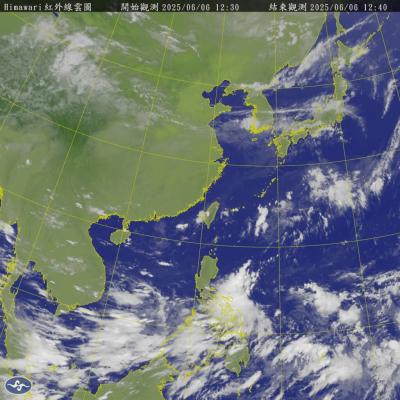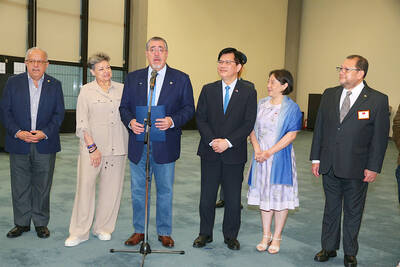Recent comments by US Secretary of State Condoleezza Rice were aimed at reminding President Ma Ying-jeou’s (馬英九) administration that a close Taiwan-US relationship is indispensable in maintaining regional and cross-strait peace, the Democratic Progressive Party (DPP) said yesterday.
DPP Spokesman Cheng Wen-tsang (鄭文燦) said his party hoped the administration would hear the “alarm bells” message that Washington was sending and use it wisely when conducting cross-strait and foreign relations.
“Ms. Rice was reminding the administration that the US is Taiwan’s leverage and buttress,” he said. “A close relationship between Taiwan and the US is essential in protecting Taiwan’s status in the Asia-Pacific region and peace in the Taiwan Strait.”
Cheng made the comments while talking to reporters about comments Rice made in an interview with the Wall Street Journal last Thursday.
Rice said that although the US encourages improvements in the Taiwan-China relationship, she wanted to remind people that the US has a strong relationship with Taiwan and would like to see “Taiwan have real space in the international community.”
Rice was responding to a question on whether the election of Ma had opened an opportunity to improve US-Taiwan relations.
Cheng yesterday said that Ma had been leaning toward China since his inauguration on May 20, causing a change in the region’s delicate strategic balance.
Recent interaction between Taipei and Beijing had apparently led to grave misunderstandings in the international community, Cheng said. Rice’s comments ought to make the Ma administration think about the position it must take as it engages further with China, he said.
Cheng also commented on speculation that National Security Council Secretary-General Su Chi (蘇起) asked the US to delay Taiwan’s military procurement package in order to create a more harmonious cross-strait atmosphere.
Cheng yesterday said that if this were true, it would sound “unbelievable” to the country’s diplomatic allies.
“It is stupid to abandon the country’s defense and diplomatic autonomy and put them on the negotiating table as a bargaining chip simply for the sake of creating a better atmosphere,” he said.
“We hope President Ma’s national security team understands what the mainstream view in the international community is,” Cheng said.

Greenpeace yesterday said that it is to appeal a decision last month by the Taipei High Administrative Court to dismiss its 2021 lawsuit against the Ministry of Economic Affairs over “loose” regulations governing major corporate electricity consumers. The climate-related lawsuit — the first of its kind in Taiwan — sought to require the government to enforce higher green energy thresholds on major corporations to reduce emissions in light of climate change and an uptick in extreme weather. The suit, filed by Greenpeace East Asia, the Environmental Jurists Association and four individual plaintiffs, was dismissed on May 8 following four years of litigation. The

STAY AWAY: An official said people should avoid disturbing snakes, as most do not actively attack humans, but would react defensively if threatened Taitung County authorities yesterday urged the public to stay vigilant and avoid disturbing snakes in the wild, following five reported snakebite cases in the county so far this year. Taitung County Fire Department secretary Lin Chien-cheng (林建誠) said two of the cases were in Donghe Township (東河) and involved the Taiwan habus, one person was bit by a Chinese pit viper near the South Link Railway and the remaining two were caused by unidentified snakes. He advised residents near fields to be cautious of snakes hiding in shady indoor areas, especially when entering or leaving their homes at night. In case of a

A tropical disturbance off the southeastern coast of the Philippines might become the first typhoon of the western Pacific typhoon season, the Central Weather Administration (CWA) said. The system lacks a visible center and how it would develop is only likely to become clear on Sunday or Monday, the CWA said, adding that it was not yet possible to forecast the potential typhoon's effect on Taiwan. The American Meteorological Society defines a tropical disturbance as a system made up of showers and thunderstorms that lasts for at least 24 hours and does not have closed wind circulation.

DIPLOMACY: It is Guatemalan President Bernardo Arevalo’s first visit to Taiwan since he took office last year, while Eswatini’s foreign minister is also paying a visit A delegation led by Guatemalan President Bernardo Arevalo arrived in Taiwan yesterday afternoon and is to visit President William Lai (賴清德) today. The delegation arrived at Taiwan Taoyuan International Airport at 4:55pm, and was greeted by Minister of Foreign Affairs Lin Chia-lung (林佳龍). It is Arevalo’s first trip to Taiwan since he took office last year, and following the visit, he is to travel to Japan to celebrate the 90th anniversary of diplomatic relations between the two countries. Arevalo said at the airport that he is very glad to make the visit to Taiwan, adding that he brings an important message of responsibility